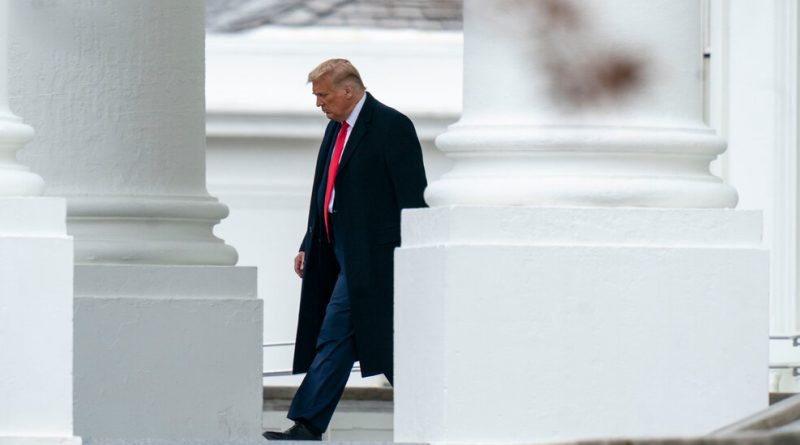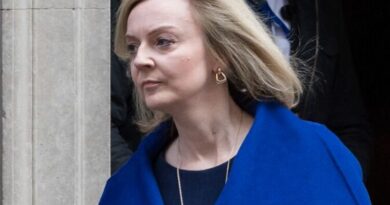Trump Failed to Follow Law on Foreign Gifts, House Democrats Say
Several gifts given by foreign countries to Donald J. Trump during his presidency are unaccounted for in government records, according to a report released on Friday by Democrats on the House Committee on Oversight and Accountability, which detailed ways in which the Trump White House had failed to follow the law in how it handled gifts.
The missing items included a $3,040 driver and $460 putter given to Mr. Trump by Shinzo Abe, the prime minister of Japan at the time, and “a larger-than-life-sized painting” of Mr. Trump given to him by El Salvador’s president, Nayib Bukele, according to the report.
A box decorated in silver patterns that a union activist in Egypt had given to Mr. Trump’s son-in-law Jared Kushner is also missing, the report said. The box was valued at $450.
The Trump White House, the report said, failed to properly document more than 100 gifts valued at more than $250,000 — including about $48,000 from Saudi Arabia — that had been given to Mr. Trump; his wife, Melania; Mr. Kushner and his wife, Ivanka Trump. Those gifts were turned over to the government and ultimately accounted for in records but were never publicly reported, as required by law.
Each government department and agency is required to submit a list to the State Department of gifts over $415 its officials received from foreign governments. Officials can keep those gifts if they are willing to reimburse the government their appraised value. The measure is intended to ensure that foreign governments do not gain undue influence over U.S. officials. (A different set of rules governs gifts from domestic sources.)
Understand the 4 Criminal Inquiries Into Donald Trump
Intensifying investigations. No former president has ever confronted the barrage of legal threats that Donald J. Trump now faces, all of which appear to be heading toward key decision points by the authorities in coming months. Here is a look at the criminal cases confronting Mr. Trump:
Georgia election interference. A special grand jury in Georgia recently concluded its investigation into whether Mr. Trump and his allies criminally interfered with the 2020 election. The decision about whether to charge Mr. Trump will ultimately be made by the Fulton County district attorney, Fani T. Willis, who has been investigating the case for the last two years.
Overturning the election. The Justice Department has been asking questions for more than a year about Mr. Trump’s efforts to overturn the election and whether he committed any crimes in connection with the Jan. 6 attack. The inquiry — one of two cases inherited in November by the special counsel, Jack Smith — could be completed by spring or early summer.
Classified documents. The special counsel is also investigating Mr. Trump’s handling of sensitive government documents after he left office. The case, which took a dramatic turn when the F.B.I. searched Mar-a-Lago, has been complicated by the discovery that President Biden and former Vice President Mike Pence also had classified files in their possession.
Hush money. The inquiry into Mr. Trump’s role in paying hush money to the porn actress Stormy Daniels during his 2016 campaign has spanned five years, two Manhattan district attorneys and multiple grand juries. Prosecutors under the current district attorney, Alvin L. Bragg, recently signaled to Mr. Trump’s lawyers that he could face criminal charges.
Before or shortly after leaving office, departing administrations typically provide the State Department with a list of the gifts they received in their final year to ensure they have followed the law. The Trump White House failed to do this, alarming government watchdogs and Democrats.
A spokesman for Mr. Trump did not immediately respond to a request for comment.
The report by the House Democrats included nearly two dozen pages of previously undisclosed White House emails and documents that raised a series of still-unanswered questions. They include the whereabouts of a piece of ornate jewelry given to Mr. Trump by the Saudis and whether Mr. Trump broke the law when he kept a computer given to him by Apple’s chief executive, Tim Cook.
How Times reporters cover politics. We rely on our journalists to be independent observers. So while Times staff members may vote, they are not allowed to endorse or campaign for candidates or political causes. This includes participating in marches or rallies in support of a movement or giving money to, or raising money for, any political candidate or election cause.
The investigation, which was prompted by disclosures about how the Trump White House mishandled gifts by The New York Times and the State Department, concluded “that the failures to disclose gifts from foreign governments were much broader than previously known and extended throughout the Trump administration.”
The committee’s top Democrat, Representative Jamie Raskin of Maryland, said that Democratic investigators on the committee, which is now controlled by the Republican majority in the House, would continue to try to track what had happened to the gifts and understand how Mr. Trump, his family and his White House apparently failed to follow the law governing how they should be handled.
“It’s so much in Donald Trump’s character to violate the entire regime governing gifts from foreign states,” Mr. Raskin said. He added that “Trump is exactly someone who the framers had in mind” when they included the emoluments clauses in the Constitution, which bars any federal office holder from accepting any type of gift from a foreign state without Congress’ consent to prevent American policy from being dictated by foreigners.
The report also raised issues involving a domestic gift. It cited an email exchange from Jan. 15, 2021, in which the Trump White House’s top ethics lawyer, Scott Gast, expressed concerns that a Mac Pro computer from Mr. Cook, which was valued at $5,999, had been intended as a gift to the U.S. government, not Mr. Trump. Gifts that are given to the government are considered government property and cannot be taken by officials.
In response, a Trump aide, Desiree Thompson Sayle, said, “Well, we can’t find it.”
A year later, in Mr. Trump’s financial disclosure forms, he listed the computer among the gifts he had received and kept. The episode in some ways echoed a dispute involving former President Bill Clinton and Hillary Clinton after they left the White House in 2001. They were accused of taking a sofa, a rug and chairs from the White House that had been given to the government, not them. The Clintons ultimately returned the furnishings.
A spreadsheet compiled by White House aides in the final days of the Trump administration listed gifts that Mr. Trump needed to decide whether he wanted to keep. Among the items that he had already decided to accept and publicly disclose was a gold pendant necklace that he had received during a trip to Saudi Arabia in 2017.
The necklace, which was valued at $6,400, was “on moving truck to Mar-a-Lago,” according to the spreadsheet. There is no evidence Mr. Trump paid for the necklace. In response to questions from the committee, the National Archives said it believed it was in possession of the necklace but had not gone through its warehouse to find it.
Matthew Cullen contributed reporting.
Source: Read Full Article


